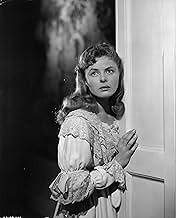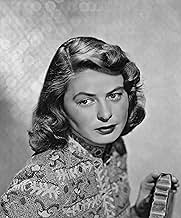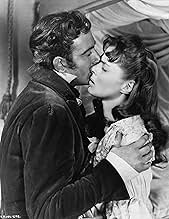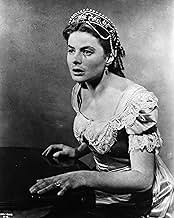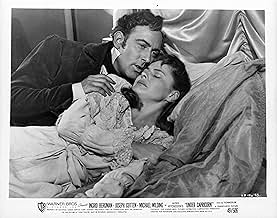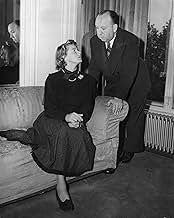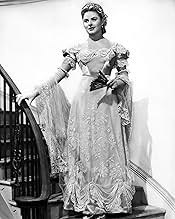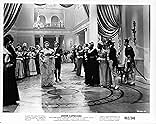Füge eine Handlung in deiner Sprache hinzuA young gentleman goes to Australia where he reunites with his now married childhood sweetheart, only to find out she has become an alcoholic and harbors dark secrets.A young gentleman goes to Australia where he reunites with his now married childhood sweetheart, only to find out she has become an alcoholic and harbors dark secrets.A young gentleman goes to Australia where he reunites with his now married childhood sweetheart, only to find out she has become an alcoholic and harbors dark secrets.
- Auszeichnungen
- 3 wins total
- Major Wilkins
- (as Francis de Wolff)
Empfohlene Bewertungen
Irish aristocratic lady Henrietta (Bergman) elopes to Australia with her cruel lover Sam Flusky (Cotten). She gradually develops the illness dipsomania, what with her lover controlling her every move with over-bearing authority and their maid Milly (Leighton) plying her with drink. A childhood friend of Henrietta's, Charles Adare (Wilding) turns up and, realising pretty quickly that all is not well, tries to help her regain a sense of stability.
The film is a laughably overwrought costume melodrama, totally ill-suited to Hitchcock's playful, suspenseful directing style. A year previously, the director had made the thriller Rope, using experimental ten minute takes, and in this film he still seems to be in the habit of allowing scenes to go on and on (maybe not ten minutes, but some bits last for six or seven minutes without a single cut). Frequently, the film feels tediously unspooled as a result. The actors seem to over-act much of the time, but it's hard to see how they could've avoided this as much of the screenplay requires them to handle some horribly overripe dialogue and reactions. Under Capricorn is undoubtedly the least interesting film that Hitchcock ever made. Those who try to persuade us that it is a misunderstood masterpiece are, I'm sorry to report, well and truly kidding themselves.
I leave the debate over whether this is Hitchcock's worst film to those that debate such things and try to list everything comparing apples and potatoes seemingly for the sake of it. As surprising as it may be, I'm not one of those but I can understand why this film has been labelled such by others because it is surprisingly run-of-the-mill for that great director. The story is soapy etc on the surface but it had great dark potential with so many threads and emotions floating around. It is surprising then that none of them are made more of and the film just sticks with the genre by becoming nothing more than an acceptable period melodrama. There is still just about enough about it to make you remember that this was from Hitchcock but I was disappointed by how straight-down-the-line it actually was in the end. The direction is still good though, with nice camera movements and shots, and the sets are colourful enough to fit the genre (if not the spirit of birthing Australia).
The cast try hard but nobody can lift the material all by themselves. To his credit, Cotton tries hard with a brooding and dark performance but he can't do it alone. Bergman is good and could have done wonders with a much more complex character, in the end what she has to deliver is nothing special and just melodrama. I didn't care for Wilding; his performance wasn't up to much and I dn't think he eld his own that well alongside Cotton and Bergman. Support from Parker and Leighton is solid but they aren't given that much to do.
Overall then this is a serviceable enough melodrama but it is easy to see why fans of Hitchcock would be forgiven for expecting more to have been made of it. The cast is good and the potential is there in the story but, aside from a steady hand and a few interesting touches, this is really just a genre melodrama that could have been more than it was.
The 1830s Australian setting proves very appropriate for the material, with the events unfolding in a newly-formed society with a primitive form of law enforcement, occupied by convicts and ex-convicts alike, where one's past is a dark secret of which nothing may be spoken. When an ambitious Irishman, Charles Adare (Michael Wilding), arrives in the Southern Land, the nephew of the new governor (Cecil Parker), he falls into an awkward friendship with the well-respected Sam Flusky (Joseph Cotton), an ex-convict who has made a name for himself on this new continent. Sam's wife, the beautiful Lady Henrietta Flusky (Ingrid Bergman), has suffered a mental breakdown, and, being an old childhood acquaintance, Charles considers it his duty to help this troubled woman to abandon her alcoholism and regain confidence in herself. Sprinkled about this stuffy Gothic melodrama are minor elements of suspense {most notable in the final scene featuring the scheming maid (Margaret Leighton)}, claustrophobia {as in Hitchcock's 'Rebecca (1940),' the old mansion is an character unto itself} and murder.
Though the story of 'Under Capricorn' isn't particularly interesting, and outstays its welcome by about one reel, the film is a fascinating feature from Alfred Hitchcock, and, if nothing else, exists as a testament to the director's technical ingenuity. The picture was Hitchcock's second in Technicolor, and its disastrous box-office performance led to the closure of the short-lived Transatlantic Pictures, which had been formed by himself and associate Sidney Bernstein after World War Two. The acting in the film is solid all around, without being particularly noteworthy, but the characters have enough twists to their personality to keep us watching. Long held as the forgotten black sheep of Hitchcock's output {except by the French, who apparently adored it}, 'Under Capricorn' is a worthy addition to the director's filmography, and stands as must-see viewing for all students of cinema.
Joseph Cotton was appealing, even though his character throughout much of the movie seemed to be villainous, and his reasons for being that way were quite apparent by the end of the film. My suspension of disbelief centered around Bergman's casting as an Irish aristocrat: once in awhile she managed to say a word that had an Irish flavor, but mostly she just sounded Swedish. However, that did not detract at all from her usual thoughtful performance. Michael Wilding irritated me a little with his foppish ways, yet even he managed to come off as a human being with faults and virtues...just like the rest of us. Leighton was superb and she, like Cotton, seemed to be a treacherous yet sympathetic character. I think it was the portrayals of complicated people with no one being painted as totally good or bad, the nuanced characterizations that I found so artistic yet real.
If you approach this movie without preconceptions, you might be drawn into it and appreciate Hitchcock's genius in an entirely different way.
There's little fault to be found with the settings, which are convincing enough. Some of the characters never really come to life, but there is still an interesting mix of them. The pace is one area that definitely could have been improved, and the pre-occupation with the long takes certainly doesn't help at all. The technique worked very well in Hitchcock's "Rope", because it meshed with the setting and the subject matter. It doesn't fit so well here in "Under Capricorn", and it often dilutes the suspense rather than increasing it.
By no means is it a total clinker - the story does have some interesting parts, and with a different approach it could have been suspenseful, even memorable. Hitchcock's technical skill is still present in many respects, and even Hitchcock's lesser achievements are still worth seeing.
The movie's overly-polished feel is consistent with the approach that was chosen. It's at least one case where the more familiar, less affected Hitchcock style would have resulted in a much better film.
Wusstest du schon
- WissenswertesIn 1958, Cahiers du Cinema (French Film Magazine) voted this movie as one of the ten greatest movies of all time.
- PatzerAs the characters gather for the dinner party, fairly early on in the film, the camera tracks backwards across the dining room. The table has been pushed into the path of the camera by the time it comes into view, but the candlesticks are still shaking severely from the jerking appearance of the table (their shaking lessens as the take continues).
- Zitate
[last lines]
Winter: We'll be sorry to lose you, sir.
Hon. Charles Adare: If I may say so, Winter, I'm sorry to go. Not a bad place. It is said that there is some future for it, there must be- it's a big country.
Winter: Then why are you leaving, sir?
Hon. Charles Adare: That's just it, Winter. It's not quite big enough. Bye, good luck.
- Crazy CreditsOpening credits roll up over a map of Australia.
- Alternative VersionenThere is an Italian edition of this film on DVD, distributed by DNA Srl: "SOTTO IL CAPRICORNO (Il peccato di Lady Considine, 1949) New Widescreen Edition + FRAGILE VIRTÙ (1927)" (2 Films on a single DVD, with "Under Capricorn" in double version 1.33:1 and 1.78:1), re-edited with the contribution of film historian Riccardo Cusin. This version is also available for streaming on some platforms.
- VerbindungenEdited into Geschichte(n) des Kinos: Fatale beauté (1994)
Top-Auswahl
- How long is Under Capricorn?Powered by Alexa
- Robert Preston---Was he supposed to star in "Under Capricorn?"
- Ingrid Bergman---When Was She Signed for "Under Capricorn"?
- Burt Lancaster---Was He Considered for the Lead in "Under Capricorn"?
Details
- Laufzeit1 Stunde 51 Minuten
- Farbe
- Seitenverhältnis
- 1.37 : 1
Zu dieser Seite beitragen


